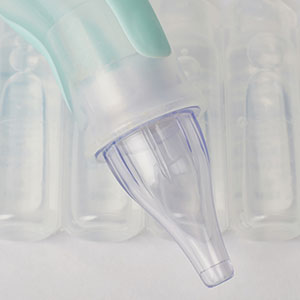One of the most common reasons that babies and children see their Pediatric ENT doctor is pediatric sinusitis. In this article, we’ll discuss the symptoms and treatments of this common problem
Pediatric Sinusitis Symptoms
Is it a cold or is it sinusitis? With sinusitis, nasal cavities are swollen or infected. This leads to blockages that worsen the problem. It may also mean an infection, which causes a fever.
After ten days, a parent should become concerned that the child’s symptoms indicate a sinus infection. The problem with diagnosis is that the symptoms mimic other illnesses. For instance, the child may cough, have a fever, and have post-nasal drip. Crankiness and low energy are symptoms. A headache is likely. Other possible symptoms, which can be misleading, include nausea and vomiting. One sure sign, if lasting more than a few days, is a thick yellow-green nasal discharge. Swelling around the eyes is another indicator of sinusitis.
 Pediatric Sinusitis Treatment
Pediatric Sinusitis Treatment
The treatment for this condition depends on its cause. Your pediatric ENT doctor can tell you what the best course of action is. A viral upper respiratory infection is a common diagnosis, and the required treatment is aimed at symptoms rather than cure. Your child may benefit from a gentle saline nasal spray or a prescribed steroid spray. Bacterial sinusitis will require antibiotics as well.
Sinus trouble can be more difficult to treat since children’s sinuses are not fully developed. This means less room for mucus to flow, leading to significant blockages. Thus, a bedroom humidifier may be used to thin secretions. A steamy bathroom or warm compresses may help a stuffy baby.
Antihistamines and decongestants are not recommended for toddlers and babies. Furthermore, these over-the-counter remedies should be discussed with your doctor if used for an older child.
In some cases, the doctor will determine that the trigger is allergies. If so, these must be addressed by reducing exposure and by providing medicine to prevent allergic reactions.
The child’s age will figure into how the illness is treated. The illness may be more serious in an infant than in a toddler. This makes it imperative that parents address their concerns with a pediatric ENT doctor. In rare cases, a pediatric sinus surgery may be recommended.
Pediatric Chronic Sinusitis vs. Acute Infection
Acute sinusitis is either viral or bacterial. These infections sometimes appear to get better only to get worse around the ten-day mark. With treatments, these illnesses should be gone within 30 days.
Pediatric chronic sinusitis is different. It reflects prolonged inflammation rather than a viral or bacterial infection. In these cases, a child suffers from related symptoms for 12 weeks or more.
When is Surgery Needed?
Surgery is a rare, but necessary option for some pediatric patients. If the patient suffers from adenoiditis, it may be worth removing adenoid tissue. This tissue can block the back of the nose, trapping secretions and promoting infection. Other ENT surgeries are similarly designed to widen passageways and promote healing.
Talk to Pediatric ENT Specialist
Parents are encouraged to talk to their Oklahoma City pediatric ENT doctor about their child’s sinus issues. Whether the issue is acute or chronic, relief is possible with the right medical care.

